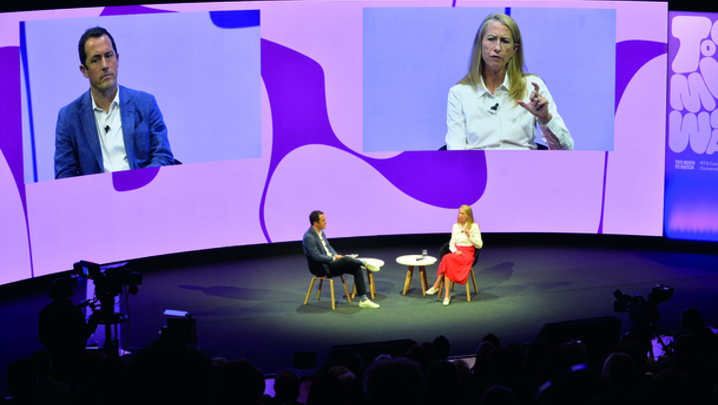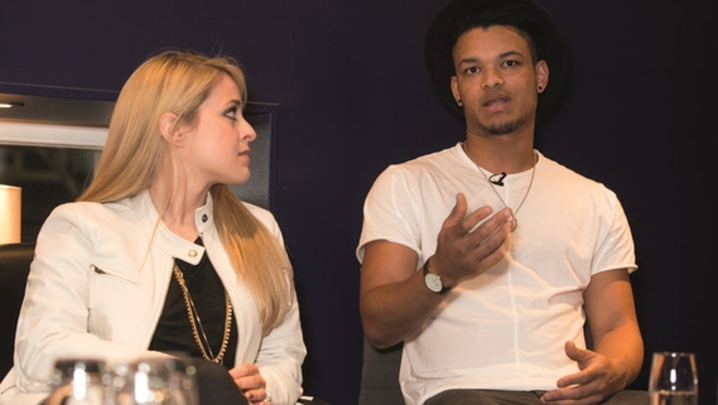Screenwriter Peter Bowker’s depictions of disabled characters in Flesh and Blood and Marvellous have captivated audiences. He tells actor Christopher Eccleston how he does it
Peter Bowker doesn’t “do diversity”. Yet, over the past couple of decades, this RTS and Bafta award-winning screenwriter has become TV’s “go-to guy” for dramas featuring people with disabilities.
A comic and compelling double act, of Bowker and his long-time collaborator the actor Christopher Eccleston, entertained the RTS North West’s capacity audience at the Lowry in March. They traced the development of Bowker’s work as he has, increasingly, challenged stereotypical representations of people affected by learning disabilities.
Eccleston told the audience that Bowker doesn’t “do diversity” for a very good reason, and quoted his friend as having said, “People say my writing is about diversity. But, as far as I’m concerned, it is about reality. Diversity is reality – not some distortion of reality, as it’s often portrayed.”
The 2002 BBC Two drama Flesh and Blood was Bowker and Eccleston’s first major project, respectively winning them a Writer and Actor award from the RTS.
In it, Eccleston plays Joe, a young man adopted at birth, who discovers that both his birth parents have learning disabilities.
Shockingly for a modern-day audience, his mother had been forced to give birth by Caesarean section under a general anaesthetic and told nothing.
Bowker spoke about the drama breaking important new ground. “The production process… was so fluid because both those cast members [Dorothy Cockin and Peter Kirby – the actors playing Joe’s mum and dad] actually had severe learning disabilities.”
But this decision brought unforeseen challenges, Bowker admitted: “One director didn’t want to use learning-disabled actors.”
He added: “Dorothy was a member of Celebrity Pig Theatre Company and was very comfortable with it all.” But Peter, whom Eccleston had met at Oldham’s Terence O’Grady Club, where they played pool together, had no acting experience.
“It was a fine balance to protect [Peter],” Bowker said. Eccleston agreed. “It was about me, particularly, building trust with him”, especially as Eccleston’s character, Joe, is required to shout at Peter in one scene.
"Diversity is reality – not some distortion of reality, as it’s often portrayed"
“I could hear you between takes,” Bowker told Eccleston, “going: ‘When I’m Joe, I’m angry with you, but when I’m Chris, I love you’.” Having finished the script, the writer realised that any scenes featuring Dorothy and Peter had to be left “incredibly loose… so that [Eccleston] knew how the scene had to come out, but none of us knew how we were going to get there”.
Illustrating how this worked with a clip from Flesh and Blood, where Joe gets his birth mother to hold his baby daughter for a family snap, Bowker showed how “Dorothy’s spontaneous reaction to the baby drove the whole scene”.
“She touches the baby’s face… it’s a thing Dorothy did when she was moved,” added Eccleston. “And [the director] Julian Farino, who’d… trained at Granada, up here in Manchester, in documentary, captured that.”
Bowker praised the cast and crew’s “willingness to be flexible”, joking “it was the best-behaved cast ever, because it’s very hard to play the twat if you have two cast members with learning disabilities.”
Flesh and Blood arose because “I was a teacher of children and adults with learning disabilities for 14 years before I was a writer, working in a ‘mental-handicap’ hospital in Leeds,” Bowker told the RTS. “And what was clear to me was that people in that hospital had sex lives, which… people were in denial about.
“[I asked myself,] ‘What would happen if someone in that hospital became pregnant?’ And I carried that idea round with me until it was ready to become Flesh and Blood.”
Flesh and Blood “very much looks at learning disability from the outside”, said Bowker. But BBC Two’s widely acclaimed Marvellous, based on the life of Stoke City kit man and unofficial Keele University student counsellor, Neil Baldwin, played by Toby Jones, has, as Eccleston put it, “the person with the disability at the absolute centre”.
“Flesh and Blood was a story honouring that generation,” Bowker added. “Yet, parallel to those people [living in hospital], was Neil Baldwin, living this independent life of his own.… It seemed improbable until I went to meet him.”
Eccleston raised an important point: “Some people questioned the ethics of having people with learning disabilities in drama.” Bowker responded by recounting one of his meetings with Baldwin. He asked him what the students thought when they were greeted by him on arrival at Keele. “Neil replied: ‘Ah. I may have been wearing a dog collar.’ And I thought, ‘You’re working an angle. And included in your angle is your learning disability.… This is interesting.’ Neil had used that to empower himself and create a life.”
Bowker continued: “Neil needed to be part of his own story. But he’s a performer, not an actor, so I knew he could [only] play himself. And the joy of casting Toby Jones is that Neil was a [registered circus] clown and Toby has trained in clowning, so there’s something about their physicality that’s already there.”
Taking his cue from the film American Splendor, where, “for a moment, the real-life man portrayed in the film walks through the set”, Bowker included several cameos in which Baldwin played himself.
"What’s clever about any dominant ideology is that you feel marginal even when you’re not"
“People initially didn’t know what the show was,” Bowker admitted. “[Stoke City manager] Lou Macari was very suspicious of the whole process.… He thought we were going to take the piss – which we did, but out of Lou, not Neil.…
“But it came off the back of what Flesh and Blood gave us: a new way of thinking about how to be inclusive.”
Series three of BBC One’s The A Word takes inclusivity several steps further. Series one, adapted from Yellow Peppers, a hit Israeli drama series produced by Keshet International, is based on Joe, who is autistic. Eccleston plays Joe’s grandad Maurice. He has a loving, down-to-earth – and sometimes cack-handed approach – to being with Joe.
As the series has developed, its cast has been extended to include Maurice’s girlfriend’s son, Ralph, played by Leon Harrop, and Ralph’s girlfriend, played by Sarah Gordy. They both have Down’s syndrome.
Eccleston said that he and Harrop, with his “perfect comic timing”, have become the show’s “double act”. He acknowledged Harrop’s “attitude, humour, and sexuality, which go against the stereotype”. Of working with Cockin, Kirby and now Harrop, Eccleston said: “It’s changed my life, my approach to the work, because I’ve learnt that you have to be playful.”
Bowker added that “one of the things I’m proudest of… is the way Leon has developed as an actor. So [spoiler alert!] in the new series… his romantic story is very much a lead story.
“I’ve gone from Neil [Baldwin] owning my story, to Leon [who is] always going to outwit [Maurice], owning his story,” he said.
Paying tribute to Gordy, he added: “I wrote it as a straight romantic drama about a young man growing up and allowed them to play it.… It works because, hopefully, it’s not patronising or sentimental.”
Series three of The A Word provides the clearest illustration yet of Bowker’s “diversity is reality” mantra.
“It makes for better drama,” he argued. “It’s not some token thing. You walk down the street, or you [meet] any family and you encounter diversity. What’s clever about any dominant ideology is that you feel marginal even when you’re not.… But the mainstream is not the mainstream.… It’s actually a minority view.”
Report by Carole Solazzo. RTS North West presented ‘Real reality television: Peter Bowker in conversation with Christopher Eccleston’ at the Lowry Theatre, Salford, on 2 March. The producer was Rachel Pinkney.





